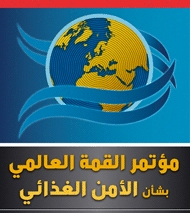By Ghassan Karam
Many Arab countries have large reserves of fossil fuels that make them the envy of the world. Saudi Arabia is the largest oil producer in the world , it is estimated that Iraq carries the same potential as Saudi Arabia and has embarked on a plan that could make it the second largest oil producer in the world within less than 10 years. Obviously there is also Kuwait, UAE, Oman, Libya, Algeria and others.All of that is well and good especially since in most cases the reserves are expected to last for decades and possibly centuries to come. The assured continued presence of such an important resource guarantees a substantial flow of funds that will go a long way towards footing the bill for economic and social development not only of the specific countries with the deposits but also for the whole region.
No one can doubt that energy is the basis without which civilization could not exist. But what is at least as important , if not even more so, is the availability of food. Modern society requires ample energy supplies but without food there would be no one to inhabit the world and demand the energy. The good news is that there is even an apparent tenuous balance , on a global bases, between the world’s ability to provide energy and food and the global demand for these two essential commodities The bad news is that the most severe case of food insecurity in the world happens to be the Arab world.
A United Nations study speaks in very unambiguous terms about the absolute need for Arab governments to take major steps in order to contain the expected effects of a major food crisis in the Arab countries. Studies by FAO; Food and Agriculture Organization;show that the Arab world imports over 50% of its caloric import every year and furthermore, this gap is expected to increase substantially at least until 2030.

The Arab countries , as a group, are the largest net importers of cereal in the world; larger than Asia. Arab countries imported around 60 million metric tons of cereals during 2008. One reason,; not the only reason; for that huge dependence on cereal is the Arab diet. On the average the typical Arab gets 35% of his/her daily calories from wheat. This problem could be partially addressed through a different and more varied diet but above all the major reason for the continued growth in the gap between production and consumption is the above average growth in population. That is one reason why family planning , if encouraged by government policy would be expected to make meaningful contributions in this area. Lower population growth rate should make it easier to manage poverty, hunger and malnutrition. It is currently estimated that over 31 million Arabs are classified as hungry, that is almost 10% of the population.
It would be very difficult to foresee a scenario that would eliminate food insecurity in the Arab countries for the very simple reason that the Arab world has already overshot its carrying capacity. It is true that the Arab countries do not exploit enough of the available arable land; Arab countries use only about 12% of the estimated 550 million hectares available; but water shortage poses a huge problem. Renewable water resources form almost an unsurmountable problem. Water places a real constraint that is very difficult to overcome. But improved agricultural techniques would help contain the resulting food insecurity gap since the average yield in the Arab world is much below the world average. This is where investments in machines, water management and research could pay dividends.
Food insecurity is essentially felt by the poor. Hunger does not occur only because of lack of food but is primarily the result of lack of access. It does not do the poor any good to have shelves stocked with food if they do not have the financial resources to purchase food. That is why the substantial rise in food prices two years ago is estimated to have created over 6 million new hungry Arabs.
Unfortunately the global conditions that led to the price increases of two years ago have not been addressed. The world grain reserves are at an all time low, the world population is still adding almost 65 million new mouths to feed each year, the biofuels programs are still being encouraged and above all the level of income in China, India and other developing countries is increasing. Economists have known for a long time that more income leads to greater demand but since the food stocks are rather limited this additional demand is manifested in higher prices. This is the problem of the poor; expensive food but low wages. Lower income Arabs have to allocate up to 65% of their income for food. That is unacceptable.

Leave a Reply
You must be logged in to post a comment.